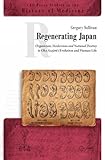Regenerating Japan : organicism, modernism and national destiny in Oka Asajiro's Evolution and human life / Gregory Sullivan.
Material type: TextSeries: CEU Press studies in the history of medicine ; volume XPublication details: Budapest ; New York : Central European University Press, (c)2018.Description: 1 online resource (xiii, 410 pages)Content type:
TextSeries: CEU Press studies in the history of medicine ; volume XPublication details: Budapest ; New York : Central European University Press, (c)2018.Description: 1 online resource (xiii, 410 pages)Content type: - text
- computer
- online resource
- 9633862116
- 9789633862117
- QH333 .R444 2018
- COPYRIGHT NOT covered - Click this link to request copyright permission: https://lib.ciu.edu/copyright-request-form
| Item type | Current library | Collection | Call number | URL | Status | Date due | Barcode | |
|---|---|---|---|---|---|---|---|---|
 Online Book (LOGIN USING YOUR MY CIU LOGIN AND PASSWORD)
Online Book (LOGIN USING YOUR MY CIU LOGIN AND PASSWORD)
|
G. Allen Fleece Library ONLINE | Non-fiction | QH333 (Browse shelf(Opens below)) | Link to resource | Available | on1043975140 |
"As the first step toward a comprehensive reinterpretation of the role of evolutionary science and biomedicine in pre-1945 Japan, this book addresses the early writings of that era's most influential exponent of shinkaron (evolutionism), the German-educated research zoologist and popularizer of biomedicine, Oka Asajiro (1868-1944). Concentrating on essays that Oka published in the years during and after the Russo-Japanese War (1904-5), the author describes the process by which Oka came to articulate a programmatic modernist vision of national regeneration that would prove integral to the ideological climate in Japan during the first half of the twentieth century. In contrast to other scholars who insist that Oka was merely a rationalist enlightener bent on undermining state Shinto orthodoxy, Gregory Sullivan maintains that Oka used notions from evolutionary biology of organic individuality--especially that of the nation as a super-organism--to underwrite the social and geopolitical aims of the Meiji state. The author suggests that this generative scientism gained wide currency among early twentieth-century political and intellectual elites, including Emperor Hirohito himself, who had personal connections to Oka. The wartime ideology may represent an unfinished attempt to synthesize Shinto fundamentalism and the eugenically-oriented modernism that Oka was among the first to articulate"--
Includes bibliographies and index.
Introduction : moss animal nation -- The organic state : the imperative of ethical life -- Palingenetic polypersons : evolutionary morphology and the question of organic individuality -- Generative scientism : organicism beyond reform -- World War Zero -- The human-way : nomic instincts and the transformation of humanity -- Nomic crisis -- Decadence and destiny -- Epilogue : evolution and the national body : an unfinished synthesis.
COPYRIGHT NOT covered - Click this link to request copyright permission:
There are no comments on this title.
